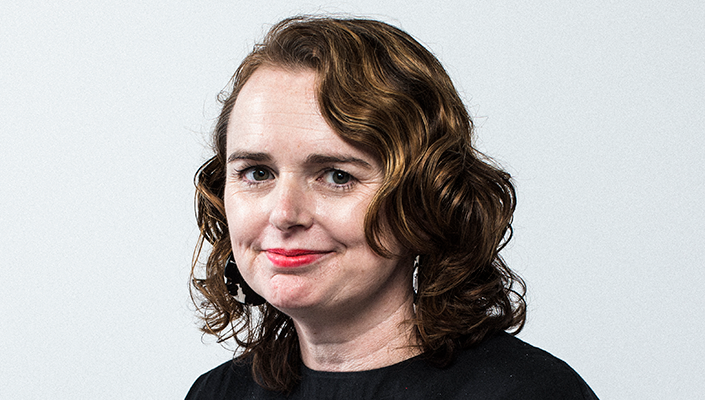The new Head of Department of Modern History, Politics and International Relations, Associate Professor Clare Monagle, is a historian of medieval theology with a lifelong fascination for faith in all its guises. She tells us more about her work, her plans as Head of Department, and reveals another long-standing obsession.
How did you originally become interested in your area of research, and what keeps you interested in it?
I am a historian of medieval theology. I grew up in a Catholic family and we went to Church a lot! My Dad had trained to be a priest, so he often explained the quite complicated theology that lay behind the various rituals to me. It always seemed fascinating and crazy to me how elaborate this theology was, how complicated it was, and how at odds its claims were in relation the secular modern world in which I was also growing up. So, when I went to University I tried to understand how Catholic theology emerged over time as a historical process, and also to understand how it managed and manages to present as ahistorical and eternal. I'm still interested in these questions, and theology and religion more generally, because forms of faith and belief shape our present in so many ways. And increasingly, I've come to see that we all have faith commitments, even if they aren't religious. People can have faith in capitalism, in their football team, in heterosexuality, or whatever.
Why is your research important?
In terms of the history of the Catholic church, I hope my work is meaningful because it reveals that ideas that seem so solid in the tradition, such as clerical celibacy, the practice of the sacraments, the role of the Pope etc.. are not set in stone, they have all been contested and challenged over time and represent historical moments, rather than absolutes. More broadly, I think it matters that we all examine our faith commitments, sacred and secular, because it helps us to understand the investments and energies we bring to the world, and to be more open and generous to the commitments of others. None of our positions and beliefs are natural, they are all the product of our personal and political circumstances, and I think we become more critical and more caring when we are able to see our own contingency, and then recognise that of others.
What would people be surprised to know about you or your work?
People tend to be a bit taken aback when they find out how much I know about celebrity gossip. I'm completely obsessed with scurrilous stuff, and when I am procrastinating I trawl the internet for rumours about the secrets of famous people. I've always been this way, at the same time as I was attending a lot of mass as a child, I was hanging out at my local library reading unauthorised biographies of Hollywood stars.
What’s your proudest achievement at Macquarie?
I set up, and continue to administer, the Emerging Scholars Scheme for the Faculty of Arts. This scheme offers mentoring and support to ECRs in our faculty, and aims to build relationships across the faculty. Through this scheme I have been privileged to work with Research Office, for whom I have the utmost admiration, and also to meet an amazing group of young scholars. I have learnt so much about so many areas of scholarship through this scheme, and I've felt like a very proud mother hen as I've watched previous participants of the scheme flourish.
What are you most looking forward to in your role as Head of Department?
I'm looking forward to supporting my colleagues during a tough year, perhaps the toughest many of us will ever experience. I hope I can provide care and encouragement to people as they grapple with new demands, and also manage the disappointments of changed plans and lost opportunities. I'm so looking forward to seeing everybody again in our new building and this period of isolation has already shown me how much the day to day life of the institution means to me. When we come back together, I am excited about using the new space to rebuild as a community, and enjoy the intellectual and social possibilities it will afford.
What else is on your agenda for the remainder of 2020?
I am hoping to survive home-schooling my children, and working from home. So far so good, but it demands a whole new competency so to speak. This was going to be an entirely different year for me than I planned, as is the case for so many people. So, my agenda is to find pleasure and meaning in my research where I can, to use teaching to provide stability and encouragement to our students, and to help my colleagues do the same.
Outside your own, what area of work or research in the Faculty of Arts inspires or intrigues you?
Through the Emerging Scholar Schemes, I have learnt so much from the ECRs about methodology. That is, working closely with scholars from outside of my home discipline, I have developed a much better grasp of how different methods work, and how they necessitate different questions and priorities. I'm inspired by this understanding, because if we are to do genuinely inter-disciplinary work we really need a deep understanding of what animates and drives scholarship in areas different to our own. So my answer is that I am inspired by all of it, because it helps me undo my own assumptions about the right way to proceed, as well as challenging me to think differently about problems I thought I had covered.
